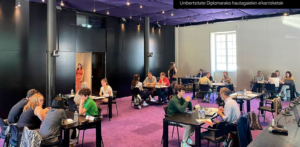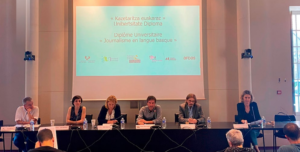The media are essential tools for the dissemination of a language, given its importance in the lives of citizens. Being present in the media, Euskera enters the different areas of society. Thanks to the media, the Basque language is audible, visible and legible in daily life. The media are therefore an inescapable element of linguistic organisation.
Currently, the presence of Euskera in the media of the continental Basque Country is developing, thanks to the development of media in Euskera, as well as the presence of Euskera in the media that mostly operate in French.
However, policies and the desire to develop the presence and use of Euskera in the media face difficulties to recruit Basque professionals.
The urgency is therefore in training. In the coming years it is not a question of forming professional Euskaldunes that allow the development of media content in Basque.
As a promoter of public policy for the Basque Country, the EEP created a working group that brings together the media of the territory. After work to identify needs, it became clear that in the coming years the media of the territory will have a great need for Basque journalists.
Based on this finding and in order to detect solutions, the EP has held meetings with three universities: The Public University of Pau and Aturrialde (UPPA), the University of the Basque Country (UPV/EHU) which proposes a journalism licence in Euskera, and the only journalism school recognised by the journalistic profession in the region of Akitania Berria (Institute of Journalism Bordele-Akitania Attached (IMONTUNE).
After several exchanges with media and universities, it was decided to create a University Diploma (UD) entitled ‘Journalism in Basque’. In September 2023 the course began with 11 learners. It"s new to content! It will end in the summer of 2025 and apprentices over two years will be given a journalism diploma in Basque signed and recognized by the three universities.

Two-year alternating vocational training will enable students and trainees to obtain a diploma. The diploma will be provided by IJBA, UPPA and UPV/EHU. The training cycle will ensure that apprentices acquire competence in three areas: Basque, journalistic profession and knowledge of the territory.
Learners have signed a professional contract with a media and universities. Trainees will teach 840 school hours for two years (420 hours per year) in Baiona, Bordeaux and Bilbao, and as Basque journalists in the media who have signed a professionalisation contract.
The commitment of the media should also be highlighted, as 8 media are involved, hiring 11 apprentices. Public and private media. This commitment has also enabled the implementation of the University Diploma.
As for the economic model, Afdas, the media training fund, fully assumes the financing of training, that is, only for students and students and the media. The means of communication, on the other hand, shall pay at least the remuneration of the learner who is his worker under the conditions laid down in the professionalisation contract. In order to support the private media, the EEP has decided to set up special on-site support for the recruitment of students and apprentices. Therefore, the private media will be able to obtain a grant of € 8,000 from OPE by hiring an apprentice in the UD table.
From the point of view of linguistic policy, this is a structuring project that will allow an effective response to the perspectives of the development of media productions in Basque in our territory. This UD will ensure the formation of a new generation of Basque journalists, with a new generation in the media sector. This will allow the development, updating and modernization of journalistic work in Basque in every way, but especially in the digital sphere, knowing that the digital sphere plays a fundamental role in the daily use of a language, especially among young generations.
From the outset, the media were very motivated to see that the universities set up the project under the coordination of the WFP, that is, that a pragmatic solution would be given to the problem, the illusion was felt at the meetings of the media working group and the PSE. However, knowing that to facilitate the economic viability of the diploma at least 10 apprentices were needed, two main questions were raised: on the one hand, if the media had the ability to offer 10 employment contracts, because they undertake to pay the student"s salary for two years, the commitment to train themselves and, on the other hand, knowing that the media in general did not give the form of an Euskaldun journalist, although the job offer was attractive.
First of all, the PSE turned to the media to find out who was willing to get involved in this dismantling and confirmed the need, as well as the media’s commitment: 10 media outlets were committed to participating and pledged to offer a total of 13 employment contracts. So you had to get learners. The participation in the dynamics of the 5 Basque media in Iparralde (Euskal Irratia, Herria, Hitza, Kazeta, Kanaldude), as well as of the two public media (France Bleu Pays Basque, France 3 Euskal Herria), the TVPI of the Sud-Creation Ouest and the Deabidak group. Therefore, all the major media in the continental Basque Country began to dance. It is also geographically recalled that they were both internal and coastal media.
In order to respond as soon as possible to this headache, a press conference was held in April 2023 at the EEP headquarters. It presented the diploma by the EEP and the universities and, in particular, called to register. The press conference is a reminder that it took place before the universities signed an agreement to follow the diploma. However, the doubts were transferred to fites, as in two weeks after the press conference more than twenty people were appointed, of which more than ten fulfilled the requirements to be able to register for the diploma. At that time it became clear that the diploma had the hardest conditions of anticipation: offers of work contracts and student-apprentices.

KANALDUDE
The cooperative Aldudarrak Video, a television producer Kanaldude, has been developing a participatory television channel in Basque for a quarter century. He has made and disseminated hundreds of videos of different formats through the web, from reports, to platos, reactivations of files, documentaries and fictions, usually co-production, etc. Throughout the week, one of them offers almost 6 hours of fresh production. Beyond the web, from 2023, it offers a 24 hour TV flow thanks to four box vendors in Iparralde (Orange, Free, SFR, Bouygues).
In recent years the company has managed to maintain the rank of 10 jobs, including 7 workers with indefinite contracts and temporary staff hired by projects. The cooperative pays 17,500 hours of work.
Thus, like many Basque media, the need for trained journalists was also perceived in Kanaldua. Therefore, the training of journalists offered by the Public Entity of the Basque Country and the Universities has aroused interest and since September 2023 has been incorporated into Lorea Mailharancin. Although Kanaldude does not offer a series of news or keep track of daily news, the work of journalists is necessary for all editorial tasks.
Pantxika Maitia
EUSKAL IRRATIAK
This new university diploma in Basque journalism has a very positive impact on the Euskal Irratia network, offering specific benefits.
On the one hand, it allows us to find future journalism professionals specialized in radio, at a time when Basque media and radio stations are currently having difficulty finding qualified journalists and radio presenters who speak Basque. To meet this need for qualified personnel, this new diploma allows us to identify and help train motivated individuals over a two-year period.
On the other hand, this new opportunity helps us in the development of Euskal Irratiak in our specific context. In fact, despite the economic challenges facing the Euskal Irratiak network, the diploma, partially subsidized, facilitated the integration of two new motivated young people. In addition, in the full development phase of the Euskal Irratiak network's offer, especially with the definition and implementation of our digital strategy for 2024, the radio station needed to build a strong team of journalists to face the development and transition phase. These new hires therefore actively help us face the current challenges of the radio station, increasing the editorial team and maintaining the ability to maintain the quality of the radio station's broadcasts.
The editorial team must address the main challenge of actively participating in the training of the two young people, teaching them to manage the journalism profession and the inherent pressure associated with the immediacy and live nature of radio.
Overall, the arrival of the two young people has been very positive. Their dynamism and innovative spirit will be valuable in the future of the radio and in the development phase we are experiencing. Our main objectives are to raise awareness of the importance of Basque media, to publicize the richness and attractiveness of the profession, and to maintain and strengthen motivation.
Teixa Ihidoy
HERRIA
The weekly Herria hired Ainhoa Etchenique for journalist training through the University Diploma program, but she was forced to drop out due to problems with her schoolwork. The board of directors of the weekly Herria nevertheless decided to hire her and she began working on January 1.
Menane Oxandabaratz, the journalist who currently manages the weekly, will retire in July and will continue to train Ainhoa Etchenique for six months.
If training journalists is necessary in the Basque media, Herria has inevitably made a mistake through the collaboration of two generations: bringing a young journalist of twenty years into the profession.
He will be given a few months to learn. To do this, they have been working together during the first month: press conferences, interviews... And also in the final stages of the weekly newspaper's printing. He has been given internal training, among other things, giving him the opportunity to learn about the history and trajectory of the different structures in the Basque Country.
Although he will have left his job, Menane has committed to meeting with Ainhoa once a month; to evaluate the work that the young journalist will carry out, to make article proposals... In other words, to provide close follow-up.
Menane Oxandabaratz


